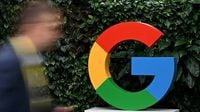In a decision that sent shockwaves through the tech industry and Wall Street alike, a U.S. federal court has ruled that Google can maintain its lucrative partnership with Apple, sidestepping the government’s most aggressive antitrust remedies and allowing the tech giants to continue shaping the future of search and artificial intelligence (AI). The verdict, delivered by U.S. District Judge Amit Mehta on September 2, 2025, capped off years of legal wrangling over Google’s dominance in the search engine market and its billion-dollar deals with device makers like Apple and Samsung.
The ruling, which came after a 15-day remedies trial in May, rejected the Department of Justice’s (DOJ) push to break up Google by forcing it to divest its Chrome web browser and Android operating system. According to The Indian Express, the court found such measures to be a “poor fit for this case,” citing legal precedent and the vast complexity of untangling Chrome from Google’s global operations. Chrome, after all, boasts 80% of its monthly active users outside the U.S., making a divestiture not only impractical but potentially detrimental to consumers worldwide. Judge Mehta wrote, “Plaintiffs have not shown that their behavioral remedies will be ineffective without the immediate divestiture of Chrome.”
The DOJ’s case, filed back in 2020, centered on Google’s exclusive agreements with device makers—most notably Apple—which made Google the default search engine on millions of smartphones and computers. These deals, the government argued, unfairly boxed out competitors and cemented Google’s monopoly. In 2024, Judge Mehta agreed, finding that Google had indeed maintained an illegal monopoly. The remedies phase, which began in April 2025, sought to determine how best to restore competition without unduly harming consumers or stifling innovation.
During the trial, high-profile witnesses took the stand, including Google CEO Sundar Pichai and Apple’s senior vice president of services, Eddy Cue. Pichai, who once led the team behind Chrome, testified that no other company was equipped to maintain the browser and its open-source sibling, Chromium, as Google has. “The DOJ’s proposals were so far-reaching, so extraordinary,” Pichai said, likening them to a forced sell-off of Google’s core intellectual property, as reported by OPB.
The court ultimately declined to ban Google from making payments to device makers for preloading its products, including its search engine and Gemini AI chatbot, as long as those deals aren’t exclusive. This distinction is critical: while Google can still pay to secure prime placement, it can no longer demand exclusivity, opening the door for rivals to compete for those coveted spots—if they can afford to.
The decision was met with mixed reactions. Lee-Anne Mulholland, Google’s vice president of regulatory affairs, expressed relief that the court didn’t order a sell-off of Chrome, stating, “It would have gone beyond the case’s focus on search distribution, and would have harmed consumers and our partners.” Yet, she added, “We have concerns that being required to share search data with rivals will impact our users and their privacy.” Meanwhile, Assistant Attorney General Abigail Slater of the DOJ’s Antitrust Division said the ruling “restores competition to the search engine market” and indicated the government is still weighing its next steps, including possible appeals.
For Apple, the ruling was a windfall. As reported by AINVEST, Apple’s stock surged 3.81% on September 3, 2025, closing at $238.47 with a staggering $15.75 billion in trading volume—a 55.32% jump from the previous day. The court’s decision preserves Apple’s $20 billion annual revenue-sharing agreement with Google for default search placements in Safari and Siri, a critical revenue stream for its Services division. In 2024, this division contributed 20.8% of Apple’s $96.2 billion in revenue, underscoring the importance of the Google pact.
Financial analysts were quick to adjust their outlooks. BofA Global Research raised its price target for Apple to $260, calling the ruling a long-term boon. Morgan Stanley noted that the decision enhances Apple’s ability to negotiate favorable terms with AI partners, while TD Cowen suggested that the $20 billion agreement could serve as a benchmark for future deals. Eddy Cue, Apple’s senior VP of Services, had previously indicated that the company is exploring AI search integrations to offset declining Safari search volumes—a trend he linked to the rise of AI chatbots like OpenAI’s ChatGPT.
Indeed, the emergence of generative AI was a central theme in the trial. The DOJ argued that Google could use its dominance in search to gain an unfair advantage in the AI market, particularly with its Gemini chatbot. The court, however, found that while AI chatbots like ChatGPT are changing user behavior and making the search market more competitive, they have not eliminated the need for traditional search engines. Judge Mehta specifically prohibited Google from securing exclusivity for its GenAI products on browsers or devices, including a ban on exclusive agreements with Apple for Google GenAI products.
One of the most significant remedies imposed by the court is the requirement for Google to share certain search index and user interaction data with competitors at a marginal cost, under five-year licenses. This measure, as detailed by OPB, is designed to help close the quality gap created by Google’s exclusive distribution agreements and enable smaller rivals—and potentially AI developers—to build better search engines. However, the court stopped short of requiring Google to share advertising data or information gathered from data feeds and partnerships, citing privacy and competitive concerns.
To ensure compliance, Judge Mehta ordered the establishment of a technological oversight committee that will monitor Google’s adherence to these measures for six years. The court also directed Google to offer search and search text ads syndication services to rivals, further enhancing competition in both search and advertising markets.
Not everyone is satisfied. Gabriel Weinberg, founder and CEO of DuckDuckGo, argued that the remedies don’t go far enough, stating, “Google will still be allowed to continue to use its monopoly to hold back competitors, including in AI search. As a result, consumers will continue to suffer.” He called for Congress to step in and “make Google do the thing it fears the most: compete on a level playing field.”
As for what’s next, legal uncertainties remain. Both Google and the DOJ have signaled the possibility of appeals, and the broader regulatory climate could shift depending on political winds. For now, though, the decision stabilizes revenue streams for Apple and Google, while nudging the industry toward greater competition and innovation—especially as AI continues to reshape how we find and use information online.
The court’s ruling may not have broken up Google, but it’s clear the search landscape—and the rules of the game—have changed. Whether that’s enough to level the playing field is a question only time will answer.





